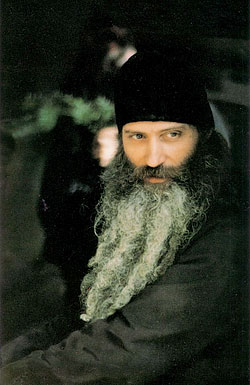"I was in hell. I know what hell is."
Доказательством, что гомосексуализм есть противоестественная страсть, а не врождённое качество, является жизнь преподобного отца Серафима Роуза. С ним произошло то обращение от греха к святости, о котором пишет апостол Павел в послании к Римлянам.
...
On a cool late afternoon in June 1956, while waiting for a train in Los Angeles, Eugene Rose, who was just shy of 22, wrote a letter to Laurence McGilvery.
"My dear Larry," it began, "I am slightly drunk, having drunk a bottle of chablis at Fred Harvey's Railroad Restaurant (Taix's had a long line; at Fred's the waitress didn't know what chablis was.) I am rather stupid for not having told you, to your face, certain things before. My slight drunkenness gives me an opportunity, though it's about time I told you when sober. If we are friends at all, such things cannot be 'hid.'
"Fact number one: my mother has discovered, rather illegitimately (I shall tell you of it later) that I am homosexual; if you have not surmised the fact already, it is time you know of it. I have not quite been kicked out of the house, but I probably shall not return after September. My mother was quite hysterical, but my father persuaded her that I am only 'sick.' I have agreed to go to my friend's psychiatrist in S.F., which I was rather interested in doing for other reasons, at parental expense.
"I suppose you have also surmised by now that I shall live this summer, and sleep, with a young man I love, and who loves me.
"I have been very stupid in Claremont. I have hardly been a friend to you. Forgive me. It is perhaps not Claremont of which I was sick, but myself. I suppose I have not told you earlier of myself because I feared you would regard me a bug, a monster, or merely 'sick,' as my parents regard me. I am certainly 'sick,' as all men are sick who are ever absent from the love of God, but I regard my sexual inclinations as perfectly 'normal,' in a sense I do not as yet understand.
"I shall be happy to hear from you, and to see you sometime soon."
McGilvery reassured Rose of their friendship. They remained close for years, even though McGilvery did not share Rose's accelerating religious fervor. "He would have known that I would have scoffed at the idea of devils roaming around the Earth and holy oils that could cure something," McGilvery says. "I could have argued about his beliefs to the end of my life."
He never got the chance. After Rose became a monk, McGilvery never heard from him again. He sent Rose a Christmas card year after year, but there was never a response. Once, a mutual friend visited Rose at Platina and asked him whether he had gotten the cards. Rose said that he had, and the friend asked why he had not written McGilvery back. "What would I say to him?" Rose replied.
....
Orthodox Christians, like all Christians who truly respect the Holy Scriptures, regard homosexual relations as a sin. Father Seraphim died to that when he converted to the Orthodox faith.
....
It was Rose's gay partner in San Francisco who introduced him to the Russian Orthodox Church Outside of Russia. But while Rose was immersing himself in the mystique of ancient Orthodoxy, his partner, who had written a book about the Church, was losing interest in it. Soon the Church took Rose wholly, and he and his partner split up.
A social doctrine adopted by the Council of Bishops of the Moscow Patriarchate last year describes homosexuality as "a sinful injury to human nature" to be "treated by sacraments, prayer, fasting, repentance and the reading of the Holy Scriptures."
Referring to his young adult years before he became fully involved in the Orthodox Church, Rose once said: "I was in hell. I know what hell is."
http://www.pomona.edu/Magazine/PCMSP01/saint.shtml



